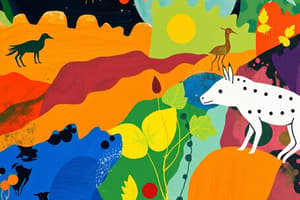Podcast
Questions and Answers
What is Ecology?
What is Ecology?
Ecology is the study of the interactions between living organisms and their biotic and abiotic environments.
Define the environment.
Define the environment.
The environment is defined as 'the sum total of living, non-living components; influences and events, surrounding an organism.'
Define Population in ecology.
Define Population in ecology.
A population is a group of organisms usually of the same species, occupying a defined area during a specific time.
Explain the concept of an Organism in ecology.
Explain the concept of an Organism in ecology.
Explain the study of Ecology in relation to the environment.
Explain the study of Ecology in relation to the environment.
What is the correct sequence of a food chain?
What is the correct sequence of a food chain?
What does Community refer to in ecology?
What does Community refer to in ecology?
Which statement(s) about food chains in ecosystems is/are correct?
Which statement(s) about food chains in ecosystems is/are correct?
Which kind of organism is/are known as decomposer organism/organisms?
Which kind of organism is/are known as decomposer organism/organisms?
Which of the following are detritivores?
Which of the following are detritivores?
What are the two broad groups that consumers can be divided into?
What are the two broad groups that consumers can be divided into?
Give an example of a primary consumer and mention its food source.
Give an example of a primary consumer and mention its food source.
What type of consumers feed on primary consumers?
What type of consumers feed on primary consumers?
What do carnivores feed on?
What do carnivores feed on?
Give an example of an omnivore and mention its diet.
Give an example of an omnivore and mention its diet.
What do scavengers feed on?
What do scavengers feed on?
What is the purpose of ecological pyramids?
What is the purpose of ecological pyramids?
Who proposed the Law of 10% and what does it state?
Who proposed the Law of 10% and what does it state?
Why do food chains typically have five or fewer links?
Why do food chains typically have five or fewer links?
What is the main reason for the rapid decrease in energy available in ecological pyramids?
What is the main reason for the rapid decrease in energy available in ecological pyramids?
What is the relationship between energy losses and the amount of energy available in trophic levels?
What is the relationship between energy losses and the amount of energy available in trophic levels?
How does the Law of 10% explain the limited efficiency of energy transfer in ecosystems?
How does the Law of 10% explain the limited efficiency of energy transfer in ecosystems?
What are the primary producers in the food chains of oceans among the following organisms: Copepods, Cyanobacteria, Diatoms, and Foraminifera?
What are the primary producers in the food chains of oceans among the following organisms: Copepods, Cyanobacteria, Diatoms, and Foraminifera?
Which of the following types of organisms can establish symbiotic relationships with other organisms: Cnidarians, Fungi, and Protozoa?
Which of the following types of organisms can establish symbiotic relationships with other organisms: Cnidarians, Fungi, and Protozoa?
According to the term 'ecosystem', how is it best described?
According to the term 'ecosystem', how is it best described?
Who first used the term 'Ecosystem' and how did he define it?
Who first used the term 'Ecosystem' and how did he define it?
What is the role of primary producers in the food chain of oceans?
What is the role of primary producers in the food chain of oceans?
How do symbiotic relationships benefit the organisms involved?
How do symbiotic relationships benefit the organisms involved?




